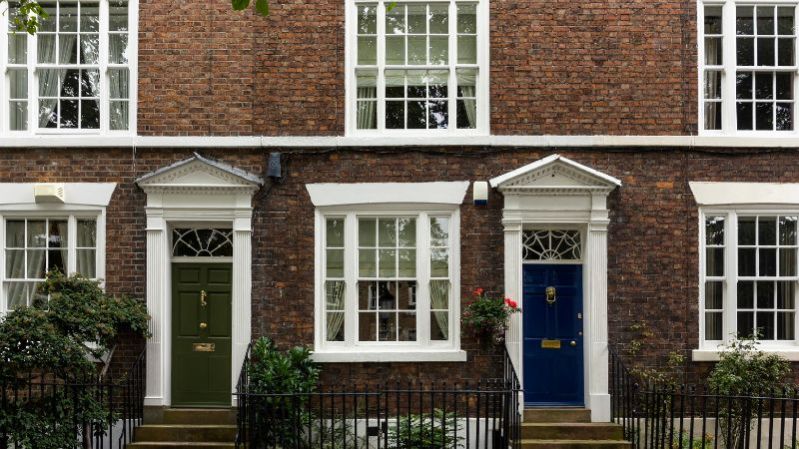Business Buy-to-Let Mortgages
If you are looking to invest in residential properties as a landlord, then the buy-to-let mortgage is the core of your funding solutions.
Buy-to-let mortgages for limited companies are typically structured as interest-only mortgages, keeping the monthly payments low (as only the interest portion of the loan is repaid each month), with a view to either selling the property at the end of the term to repay the principal of the loan, or to restructure the finance through a remortgage to continue to own the property.
Unlike a residential repayment mortgage, the loan value is evaluated based on the projected rental income, rather than any other factor. In most cases, it will be required that the rental income provides a minimum of 125% of the monthly mortgage repayment - a rental property with an outgoing of £800 per month in mortgage repayments, will need to be rented out for £1,000 or higher to meet this requirement.
This is to provide a margin of risk safety, as well as to show the viability of the purchase as a profit-making business venture.

Commercial Mortgages for Business Rental
Being a landlord doesn’t just mean dealing with residential properties. Investing in commercial property to lease out follows a similar path through a commercial mortgage, though the criteria are somewhat different when compared to a residential buy-to-let.
Similarly, commercial and industrial properties such as warehouses, have a more complex risk and underwriting portfolio as many factors have to be taken into accounts, such as the intended usage, facilities of the property, and additional business risk and investment, such as security.
For these reasons, LTV on many commercial properties are lower than residential buy-to-let properties, with 75% LTV commercial mortgages far more likely than 80% LTV ones. Often additional capital or investment is required when comparing investing in commercial over residential properties.

Portfolio Mortgages
A portfolio mortgage can be seen as functioning as a many-mortgages-in-one package. With portfolio mortgages, a single mortgage structure is used to purchase multiple properties. These do not have to be bought at the same time, with additional individual buy-to-let mortgages able to be folded into the portfolio mortgage over time.
With a single governing portfolio mortgage, equity that has been built up in existing properties can be leveraged to provide the needed deposit value for future properties, maintaining an appropriate LTV on the overall portfolio mortgage and providing access to superior loan rates. This provides a far superior growth strategy for businesses looking to develop a property ‘empire’ over managing multiple accounting and administrative complexities to accomplish a similar level of buying power with individual buy-to-let mortgages.
Portfolio mortgages are a key product for businesses looking to use loans for rental properties. For more information about portfolio mortgages and how they can help your business grow, speak to a specialist at Clifton Private Finance today.

Bridging Loans and Auction Property Finance
Bridging loans are a short-term funding solution for purchasing a property when a long-term mortgage solution is inappropriate. This may be, for example, because the time between finalising the deal for a property purchase and needing to pay in full is short and a mortgage cannot be completed in time, or because the building needs renovation before it can be used to secure a mortgage.
Auction finance, designed to assist in buying property at auction, is a form of bridging loan, tailored specifically for the 28 day full payment system of an auction purchase and providing the breathing space needed to put in place a mortgage.
Bridging loans are extremely flexible and can be put in place very quickly, making them a perfect financial product for a specialised requirement.

Mezzanine Finance
Sometimes called ‘subordinate debt’ or ‘hybrid debt’, mezzanine finance is a combination debt and equity finance option, where the borrowing is further secured by an option for the lender to convert remaining debt to equity in the property if needed.
While it is extremely rare that mezzanine finance is used to wholly purchase property, it is often utilised as an option to provide the additional funding needed as deposit where the main mortgage LTV is not quite high enough to make the purchase possible.
Mezzanine finance is a form of subordinate debt, meaning it is repaid behind the senior debt of the primary mortgage. For this reason, it is a more risky undertaking by the lender and will have higher rates accordingly.
Leasing Part of a Business Property
Many property businesses seek to make the maximum use of the property they own, resulting in mixed-use properties that can be part owner-occupied and part leased out.
Examples include:
- A service business buying a larger office block, using part of it for their own administration team, and leasing out unused office space.
- A retail company purchasing a shop that comes with residential flats on the upper floors, using the shop for the business, but renting out the flats to tenants.
- An agricultural business purchasing land for farming use and leasing out a portion to a third party to run as a campsite.
Situations like these can require specialist and complex dedicated finance solutions that require individual underwriting and risk assessment.
Mixed-use mortgages are obtained by the lender evaluating the income that will be used to make loan repayments on an individual level. Considerations will be made regarding multiple factors, including:
- The size of the split between the businesses use and the proportion that will be leased out.
- The business's financial assessment and ability to pay the portion of the mortgage that is for business use. This would include a full understanding of the business plan.
- The expected rental yield of the leased portions, and an evaluation of the tenant’s reliability.
There are both pros and cons from mixed-use properties, with the benefit of a diverse income stream that can help provide stability in difficult periods balanced against the potential risks involved if either side of the mortgage payment equation struggles to meet expectations.
Businesses looking to obtain a mixed-use mortgage should expect higher interest rates and potential limitations on the mortgage agreement.
At Clifton Private Finance, our specialist team have the expert know-how you need to navigate the difficulties - why not speak to us about your business plan and let us help you get the finance you’re after?
Business Loans for Rental Property Companies
Beyond the obvious need of property acquisition, companies may well need additional funding throughout their lifetime for both capital and cash flow needs that arise from rental properties. These can include:
- Renovations
- Purchasing furnishings for the property
- Managing cash flow during dry periods without tenants
- Meeting regulatory requirements and legal obligations for landlords
- Paying tax bills
At Clifton Private Finance, our team of business funding specialists are here to help you every step of the way. We can advise on:
- Unsecured loans - A flexible funding option that’s great for smaller expenses, such as furnishing or minor alterations to bring the property up to spec. Unsecured loans are easy to apply for and obtain, but will generally have higher interest rates to other forms of business finance.
- Lines of credit - Basic lines of credit, such as overdraft facilities or company credit cards can provide a back up that helps you get through difficult periods. However, good financial management is essential to avoid spiralling into debt with the potentially high rates of these easy-to-obtain loan types.
- Asset finance - If you are looking to purchase furniture, equipment, or machinery to enhance or develop your properties, then asset finance options offer an excellent way to spread the cost without putting a strain on existing capital. Find out more about asset finance in our knowledge base articles.
- Cash flow finance - A range of specialist funding options to help you manage seasonal ups and downs with your income, cash flow finance can help in many ways, from providing the money needed to cover payroll, to ensuring you have the funds available to keep the business stable when properties lie temporarily tenant-less.
- Development finance - A larger-scale funding option for property businesses looking to convert or upgrade properties, specialist development funding can offer both senior and subordinate debt options leveraged on your properties to give you the boost of capital you need.
Preparing for Property Rental Business Loans
When looking for significant long-term financing, it’s important that your business is ready to undertake the additional financial burden, with a well-developed business plan and the income required to cover all liabilities.
Lenders will examine your application thoroughly, delving into your business history and financial stability to ensure that you meet the criteria for lending. Among other things, they will consider:
- Your creditworthiness - A mixture of your current income and financial stability and your detailed credit history, creditworthiness is of primary interest to all lenders.
- Your rental yield projections - When purchasing property to rent out, it is important that you have properly evaluated how much rent you will bring in and the level of stability it provides. Lenders will be keen to see a confident and realistic projection of strong rental yield to show viability in the application.
- Loan requirements and your business investment - The size of your investment, in the form of the deposit, is a key factor in determining both the loan rates and its overall approval. You must understand the loan-to-value you need and have comprehensive records that detail where the remaining investment is coming from.
- Property type and condition - Mortgages are secured through the property itself, and each type of property will have its own risk profile that the lender will take into account. Condition is also extremely important and mortgages may be difficult to secure on property that is in need of considerable redevelopment.
Applying for a Business Loan for Rental Properties with Clifton Private Finance
Clifton Private Finance are here to help. Our commercial mortgage and business loan specialists have all the experience you need to navigate the complexities of the funding landscape and obtain the finance you’re after.
Speak to one of our team today and ask us about business loans for rental property - we’ll make your vision of a growing property portfolio a grounded reality.









.jpg)


